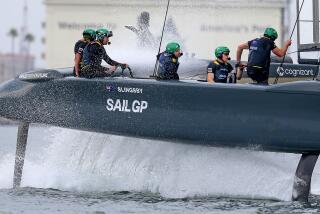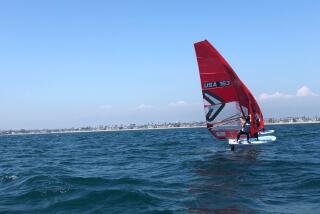SAILING CONGRESSIONAL CUP : Five Top-21 Skippers Head Four-Day Event
- Share via
Some of the world’s best sailors this side of San Diego will open four days of match racing in the 28th Congressional Cup at Long Beach today.
The event is frustratingly close to San Diego for the competitors.
“I feel we’re missing out,” says Chris Law of the United Kingdom, which isn’t involved in the Cup for one of the few times in the event’s 141 years. “I’m personally disappointed not to be involved. I feel a little bit left out.”
Law was helmsman on the White Crusader at Fremantle, Australia, in 1986-87 and this time was involved with Peter de Savary’s Blue Arrow Challenge that bogged down short of the starting line. Instead, he has been campaigning on the World Match Racing Circuit, winning the Australia Cup on the Swan River at Perth in February.
Australia’s Gordon Lucas, whom Law defeated in the championship final at Perth, became a late entry in the Congressional last week when Denmark’s Valdemar Bandolowski was hospitalized because of pneumonia.
There are no past winners, and the only participants in the current America’s Cup entered are Espana ’92 skipper Pedro Campos, whose team was eliminated last week, and Bertrand Pace, a member of the Ville de Paris afterguard that has advanced to the challenger semifinals starting March 29.
Three-time winner Rod Davis and two-time defending champion Chris Dickson are in San Diego priming for the semifinals with New Zealand and Nippon, respectively. But the Congressional, which will start at 11 a.m. each day or whenever the wind settles in, doesn’t lack for talent. Five of the skippers are ranked in the top 21.
This is the third year the event will be using the custom Catalina 37s that were built for the tight, tactical racing typical of the world circuit.
“We’re aggressive to the point of no contact,” Law said. “We’re not damaging the boats or hurting people. We’re playing it to the rule, just like in any aggressive sport.”
On-water umpires, a concept first developed in the Congressional, keeps competitors honest.
“There’s a fair level of professionalism now, a good level of sportsmanship, and the sport is maturing,” Law said. “There’s also a very good rapport between umpires and competitors now. It’s not a schoolmaster-schoolchild relationship.”
At Perth, Law narrowly beat France’s Thierry Peponnet when his boom swung across the finish line while his boat was sideways to the line dead in the water, having just completed a penalty turn. Any part of the boat counts.
“We said to the race officer, ‘How much did he beat us by?’ ” Law recalled. “He said to us, ‘Your boom crossed the line before his bow, but you hadn’t completed your 360.’ ”
Law appealed that, technically, he had completed the penalty turn, and the umpires agreed.
“We didn’t plan (on winning by) the boom,” he said.
Later, in the final, he wedged his boat inside Lucas’ at a downwind mark, leading to a foul by Lucas, and when Lucas fouled again during the last race of the best-of-three finals, Law won easily.


